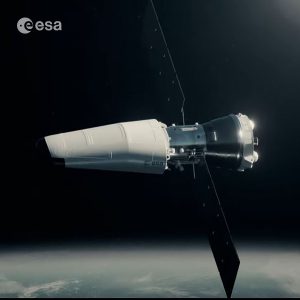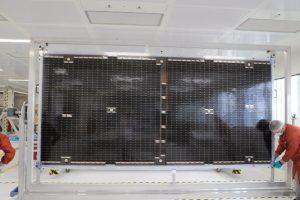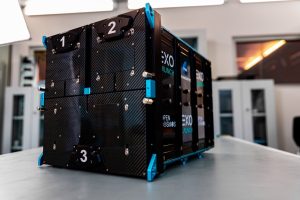Tyvak – specifically, the Italian corporate entity of the organisation – will be the prime contractor for the project that also involves a consortium of Italian industries and research institutions, including Polytechnic University of Turin, the University of Padova, and StellarProject SRL.
The mission will see a deployed nanosatellite performing proximity operations manoeuvres around Space Rider, demonstrating in-orbit servicing capabilities.
Space Rider
For its part, Space Rider is intended to support research in pharmaceutics, biomedicine, biology. And at the end of its initial mission – due in 2025 – Space Rider will return to Earth – landing on a runway – with its payloads ready to be unloaded and refurbished for another flight.
Tyvak’s role is to develop the nanosatellite to be “onboarded and deployed” during the experimental phase in orbit, on one of the ESA’s Space Rider flight missions. This will, the organisations believe, pave the way for future recurring servicing missions.
“Terran Orbital is honored to be selected once again for a prime contract with the European Space Agency,” said Marc Bell, Terran Orbital Co-Founder, Chairman, and Chief Executive Officer.
“Using space technology for research in areas, such as proximity operations and in-orbit servicing, will be a huge benefit for our partners and the protection of precious and strategic orbital assets. I am excited to see Tyvak International s.r.l. in the forefront.”
Terran Orbital
Tyvak International, in turn, is wholly-owned by Terran Orbital, the satellite systems company, which is based in Boca Raton, Florida.
Terran also recently announced that Lockheed Martin had awarded it a contract to build 36 satellite buses. These are for the U.S. Space Development Agency’s (SDA) Tranche 2 Transport Layer (T2TL) Beta constellation.
Under the contract, Terran Orbital will deliver the buses to Lockheed Martin, which will conduct payload integration and jointly operate the satellites with SDA.
According to the U.S. agency, the T2TL Beta constellation will “advance the Proliferated Warfighter Space Architecture’s (PWSA) initial warfighting capability with targeted technology enhancements, mission-focused payload configurations, and increased integration”. The PWSA is designed to provide a resilient, low-latency communication system to connect warfighter platforms around the world, and also to help target threats and detect and track missiles.
“We congratulate Lockheed Martin on another big contract win in support of SDA’s Transport Layer mission”, said Bell. “We are proud that Lockheed Martin has selected Terran Orbital to deliver high-quality satellite buses for a vital mission to connect and protect U.S. military personnel worldwide.”
Terran Orbital is already building 42 satellites for Lockheed Martin to help it fulfill a $700 million contract for the first iteration, SDA’s Tranche 1 Transport Layer (T1TL). This is currently scheduled for a “late 2024” launch.
Image: European Space Agency (ESA)
See also: Terran Orbital expands production, supporting seven satellite buses
 Electronics Weekly Electronics Design & Components Tech News
Electronics Weekly Electronics Design & Components Tech News




